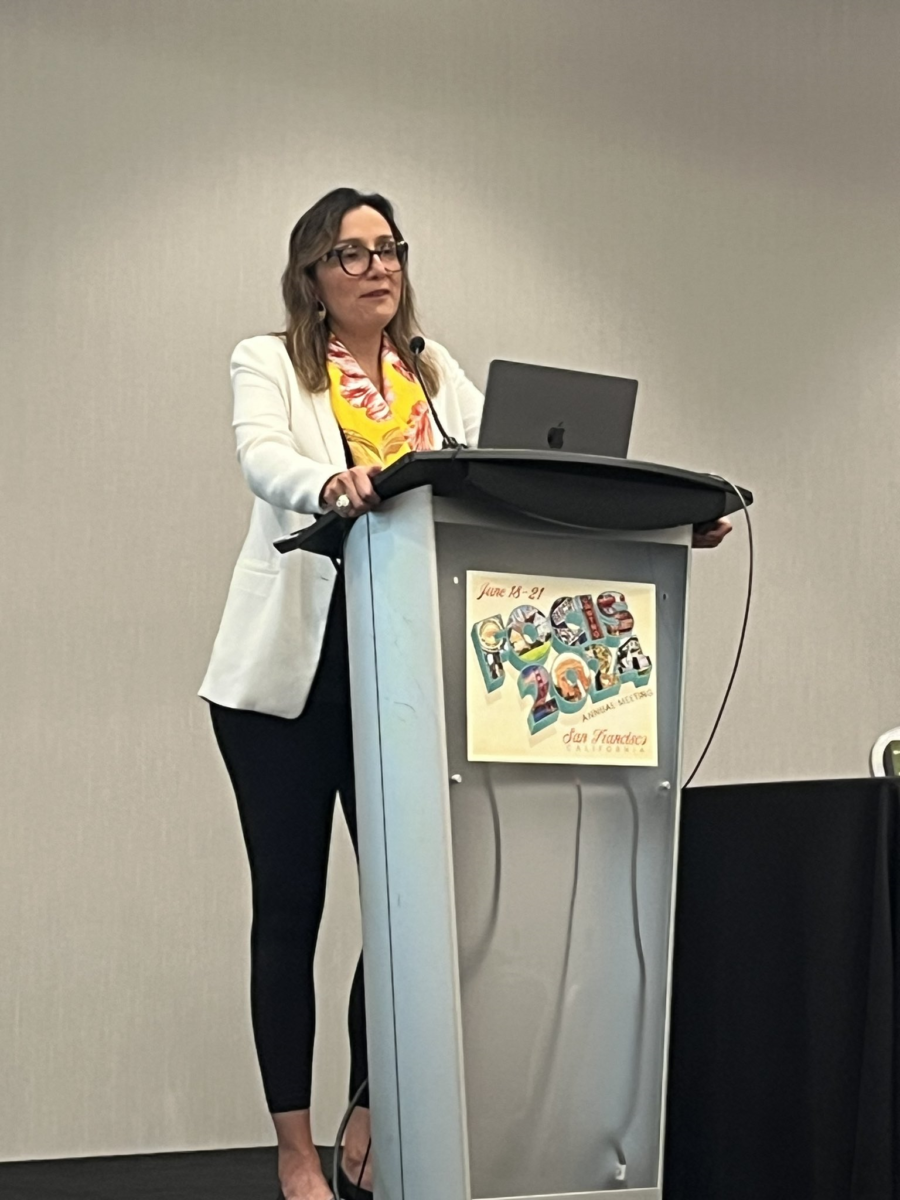Women in Clinical Immunology



Recent Event
Conversation of Inclusion and Representation: Who is Navigating and Networking at Conferences?
Thursday, June 20, 2024, 7 a.m. PT
San Francisco Marriott Marquis, 780 Mission St, San Francisco, CA 94103
As we all know, attending conferences is an exciting opportunity to immerse ourselves in learning and connecting. Yet, there’s often a question mark about our ability to approach a microphone and ask a question. However, this is a conversation about change.
Attendees explored how academic conferences are typically approached, and read two articles, 1) Fears of Backlash Underlie Gendered Participation in Question-and-Answer Sessions—University of California-Berkeley via OSF; 2) Men Dominate Q&A Sessions At Academic Conferences—Here’s Why It Matters—Forbes. Together, they brainstormed innovative ways conferences could be redesigned to better support diversity.
FOCIS 2024 registration was required to attend the session.

2023 Event
History of Women in FOCIS: Navigating Your Way Into a Leadership Role
Session Co-Chairs:
- Elaine Reed, PhD, University of California – Los Angeles;
- Terri Laufer, MD, University of Pennsylvania;
- Megan Levings, PhD, The University of British Columbia
Over 115 people joined us for the WICI/WIT session during the FOCIS 2023 Annual Meeting in Boston. The June session was co-hosted by the WICI Committee of FOCIS and Women in Transplantation (WIT), a special initiative of The Transplantation Society.
The session included a keynote presentation by Maria Grazia Roncarolo, MD, discussing women’s history in FOCIS and navigating leadership roles. She talked about believing in oneself, overcoming stigma, embracing the unique leadership style of women, and the importance of women supporting each other. She shared her career journey and reflected on her challenging yet exciting journey. She identified several critical points for discussion. They included encouraging women to believe in themselves, overcoming the stigma of not being good enough, accepting that balancing multiple roles may never be perfect, exploring the unique leadership style of women and its strength in creating synergistic teams, and the importance of women supporting and helping each other.
After the presentation, roundtable discussions were guided by specific questions on diversity, equity, and inclusion. A key issue was the lack of representation of women and minorities in grant writing and immunological research. Women face discouragement from their peers and lack motivation to get involved. Women often contribute to committees but are not recognized as leaders in scientific papers and administrative positions. Bridging the gap between LGBTQ-friendly communities and institutions is also crucial. Efforts are being made to create a more diverse environment in science and medicine for younger women. However, there is still less attention on diversity and inclusion internationally, and more needs to be done, especially in industry and decision-making roles. Individuals can contribute to promoting diversity and inclusion by joining affinity groups, mentoring, offering fresh perspectives, speaking out against disparities, amplifying women’s voices, and giving preference to nominating women as speakers and honorees. Taking extra time to meet with diverse students, applying for diversity grants, and using inclusive language can also help. Other discussions centered around how organizations are implementing DEI initiatives. While some organizations are implementing them, they are not yet top priorities. Organizations should implement strategies such as conducting salary surveys for equitable compensation, establishing professional women’s committees, setting annual goals for women in leadership positions, and starting with a highly diverse lab when forming new laboratories.
Session attendees had positive feedback on the session. The attendees valued Maria Grazia Roncarolo’s presentation and gained an understanding of the challenges she faced in her career pathway. The personal story of the keynote speaker also raised awareness among the participants. The small group facilitation and the participation of more senior women were greatly appreciated.
Keynote Presentation
History of Women in FOCIS: Navigating Your Way into a Leadership Role
by Maria Grazia Roncarolo, MD, Stanford University
Group Discussion
Facilitated by WICI & WIT Representatives
Questions:
- Do you feel as if your organization cares about diversity and inclusion?
- Have you faced any obstacles in your career progression or the ability to participate fully in work processes not experienced by all of your colleagues? Describe those obstacles.
- Have you faced or witnessed prejudice or discrimination in your work setting? Describe what happened.
- Do you feel the field of immunology cares about diversity and inclusion?
- What is one thing everyone can do to impact diversity and inclusion in their organization positively?
- What motivated you to get involved in being an advocate for change?
- How can DEI be a priority for organizations that have other significant issues to deal with?
Guideline to Promote Diversity in FOCIS Leadership and Governance
The guideline aims to formalize the current informal, alternating male/female presidential track and expand it to include a representation that reflects the characteristics of the FOCIS membership on board and committee service.
Approved by the FOCIS Board of Directors, February 15, 2023
WICI Manuscript
ORIGINAL RESEARCH article
Abstract
The authors of this manuscript, all women who have been deeply committed to the Federation of Clinical Immunology Societies (FOCIS), performed a retrospective analysis of the gender equality practices of FOCIS to identify areas for improvement and make recommendations accordingly. Gender data were obtained and analyzed for the period from January 2010 to July 2021. Outcome measures included numbers of men and women across the following categories: membership enrollment, meeting and course faculty and attendees, committee and leadership composition. FOCIS’ past and present leaders, steering committee members, FCE directors, individual members, as well as education, annual meeting scientific program and FCE committee members and management staff of FOCIS were surveyed by email questionnaire for feedback on FOCIS policies and practice with respect to gender equality and inclusion. Although women represent 50% of the membership, they have been underrepresented in all leadership, educational, and committee roles within the FOCIS organization. Surveying FOCIS leadership and membership revealed a growing recognition of disparities in female leadership across all FOCIS missions, leading to significant improvement in multiple areas since 2016. We highlight these changes and propose a number of recommendations that can be used by FOCIS to improve gender equality.
Keywords: gender, equality, professional society, career, leadership
Resources
The curated articles are meant to assist organizations and individuals in their efforts to bring equality to their networks.
Equity, Diversity, and Inclusion in Academia: lessons from the Canadian Society of Immunology
In 2021 the Canadian Society of Immunology opened its conference with equity, diversity, and inclusion (EDI) workshops. SCI hopes that their experiences can provide a roadmap for others to engage in action-oriented conversations to render academia more equitable, diverse, and inclusive.

Women in Immunology Databases
Women Speakers Database is a resource provided by the IUIS Gender Equality Committee (GEC) to enhance the representation of women within the immunological community. This searchable database of women can assist in identifying individuals to invite as speakers at conferences, chairs of sessions, presenters of seminars, participants on review panels, and editorial boards.
WICI and FOCIS are not alone in their efforts for gender equality. The following organizations are active in their efforts to increase diversity in the field.
Equity, Diversity and Inclusion Committee of the Canadian Society of Immunology
The EDI committee provides consultation to the CSI council, helping to develop programs that ensure equal treatment of all Canadian immunologists regardless of career stage, affiliation, race, ethnicity, age, gender, spiritual belief, sexual orientation, gender identity, gender expression, disability, or other diverse backgrounds.
The EDI committee strives to make the CSI a more equitable, diverse, and inclusive society and to become a national and international role model for other societies through novel and strategic EDI initiatives. The EDI committee achieves this through liaising with CSI council to develop an EDI strategic plan, build awareness of EDI issues, create an environment where all members feel valued and are open to other viewpoints and provide advice and counsel to CSI council and the trainee engagement committee (TEC) on EDI issues.
WICI Committee
The Women in Clinical Immunology (WICI) Committee embodies FOCIS’s ongoing commitment to ensure a fair, equitable, and welcoming environment for all engaged in the science and management of immunological disorders.
This commitment is underscored by the stated mission, which is to foster understanding and awareness of gender issues, promote the career development of women in immunology, and advance understanding of the role of sex and gender in immunological disease.
Championed by several successful immunology leaders, this committee is chaired by Dr. Elaine F. Reed, PhD, University of California – Los Angeles, and co-chaired by Dr. Terri Laufer, MD, University of Pennsylvania. They are joined by Founder and Past Chair, Dr. Maria-Grazia Roncarolo, MD, Stanford University, and FOCIS President, Dr. Megan Sykes, MD, Columbia University. In addition to these core leaders, the committee will include a steering sub-committee made up of seven members nominated by the FOCIS Member Societies. View the full Committee roster here.



